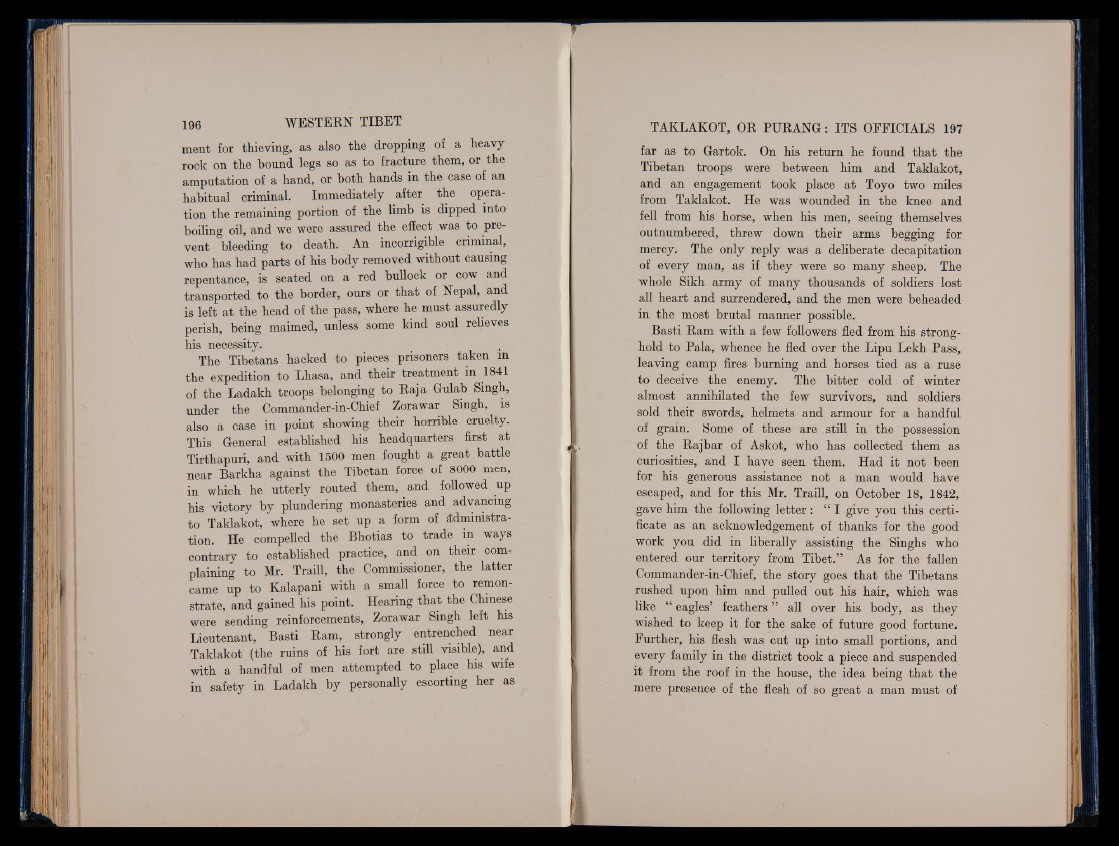
ment for thieving, as also the dropping of a heavy
rock on the bound legs so as to fracture them, or the
amputation of a hand, or both hands in the case of an
habitual criminal. Immediately after the operation
the remaining portion of the limb is dipped into
boiling oil, and we were assured the effect was to prevent
bleeding to death. An incorrigible criminal,
who has had parts of his body removed without causing
repentance, is seated on a red bullock or cow and
transported to the border, ours or that of Nepal, and
is left at the head of the pass, where he must assuredly
perish, being maimed, unless some kind soul relieves
his necessity, . -
The Tibetans hacked to pieces prisoners taken m
the expedition to Lhasa, and their treatment in 1841
of the Ladakh troops belonging to Raja Gulab Singh,
under the Commander-in-Chief Zorawar Singh, is
also a case in point showing their horrible cruelty.
This General established his headquarters first at
Tirthapuri, and with 1500 men fought a great battle
near Barkha against the Tibetan force of 8000 men,
in which he utterly routed them, and followed up
his victory by plundering monasteries and advancing
to Taklakot, where he set up a form of administration.
He compelled the Bhotias to trade m ways
contrary to established practice, and on their complaining
to Mr. Traill, the Commissioner, the latter
came up to Kalapani with a small force to remonstrate,
and gained his point. Hearing that the Chinese
were sending; reinforcements, Zorawar Singh left his
Lieutenant, Basti Ram, strongly entrenched near
Taklakot (the ruins of his fort are still visible), and
with a handful of men attempted to place his wife
in safety in Ladakh by personally escorting her as
far as to Gartok. On his return he found that the
Tibetan troops were between him and Taklakot,
and an engagement took place at Toyo two miles
from Taklakot. He was wounded in the knee and
fell from his horse, when his men, seeing themselves
outnumbered, threw down their arms begging for
mercy. The only reply was a deliberate decapitation
of every man, as if they were so many sheep. The
whole Sikh army of many thousands of soldiers lost
all heart and surrendered, and the men were beheaded
in the most brutal manner possible.
Basti Ram with a few followers fled from his stronghold
to Pala, whence he fled over the Lipu Lekh Pass,
leaving camp fires burning and horses tied as a ruse
to deceive the enemy. The bitter cold of winter
almost annihilated the few survivors, and soldiers
sold their swords, helmets and armour for a handful
of grain. Some of these are still in the possession
of the Rajbar of Askot, who has collected them as
curiosities, and I have seen them. Had it not been
for his generous assistance not a man would have
escaped, and for this Mr. Traill, on October 18, 1842,
gave him the following letter: “ I give you this certificate
as an acknowledgement of thanks for the good
work you did in liberally assisting the Singhs who
entered our territory from Tibet.” As for the fallen
Commander-in-Chief, the story goes that the Tibetans
rushed upon him and pulled out his hair, which was
like ‘ ‘ eagles’ feathers ” all over his body, as they
wished to keep it for the sake of future good fortune.
Further, his flesh was cut up into small portions, and
every family in the district took a piece and suspended
it from the roof in the house, the idea being that the
mere presence of the flesh of so great a man must of